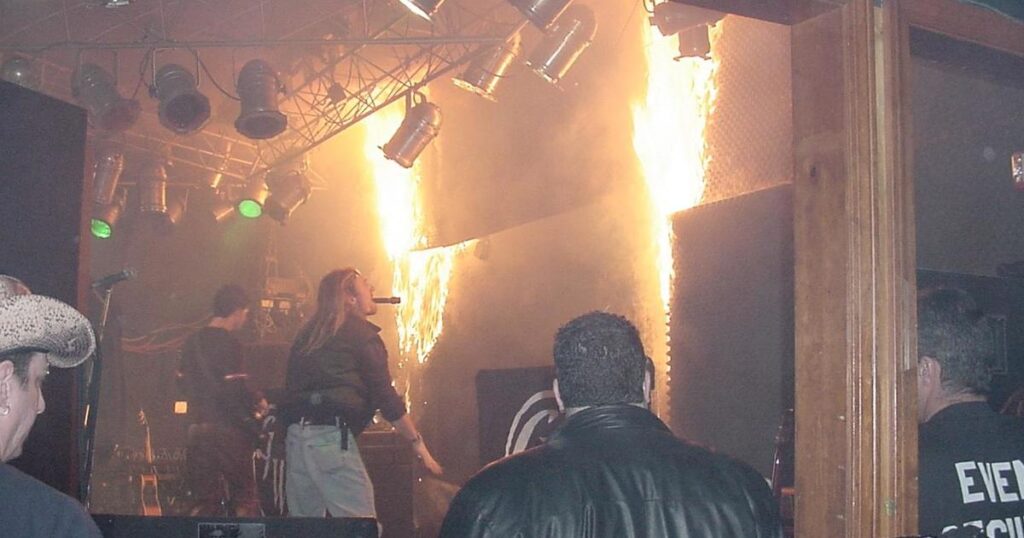
The Station nightclub disaster remains one of the most tragic events in the history of live music performances, forever etched into the collective memory of the small community of West Warwick, Rhode Island. On the night of February 20, 2003, a routine rock concert turned into a horrifying inferno, claiming 100 lives and leaving more than 200 people injured.
The ill-fated evening featured the band Great White, known for their hard rock sound. The venue, a modest-sized nightclub called The Station, was packed with enthusiastic fans ready to enjoy an evening of live music. However, a catastrophic chain of events unfolded, highlighting the dire consequences of lax safety measures and the use of pyrotechnics in confined spaces.
The catalyst for the disaster was the band’s use of pyrotechnic effects, which involved shooting off fireworks as part of their stage show. The pyrotechnics ignited highly flammable soundproofing foam that covered the walls and ceiling of the club. Within seconds, the club was engulfed in flames, creating a deadly and chaotic situation.
As the fire rapidly spread, panic ensued. The crowded venue became a scene of sheer terror as concertgoers struggled to escape the engulfed building. The limited exits and the layout of the club exacerbated the situation, making it difficult for people to find a way out quickly. The intensity of the fire and the thick, toxic smoke made it nearly impossible for many patrons to navigate the chaos.
Emergency responders rushed to the scene, but the scale of the disaster overwhelmed their efforts. The lack of proper safety measures, including fire sprinklers and adequate exits, exacerbated the tragedy. In the aftermath, investigators discovered that the club had not obtained the necessary permits for the pyrotechnic display, and the foam used for soundproofing was highly combustible, violating fire safety codes.
The Station nightclub disaster prompted a wave of introspection and led to increased scrutiny of safety regulations in public venues across the country. It highlighted the critical need for stringent enforcement of fire codes, proper emergency exits, and comprehensive safety measures, particularly in establishments hosting large gatherings.
The tragedy also sparked legal actions, with multiple parties held accountable for their roles in the disaster. The band’s tour manager and the owners of The Station nightclub faced charges related to the inadequate safety measures and unauthorized use of pyrotechnics. The incident became a stark reminder of the responsibility that event organizers, venue owners, and performers bear to ensure the safety of their audiences.
As a result of the Station nightclub disaster, there have been notable advancements in fire safety regulations and increased awareness of the potential hazards associated with live performances. Concertgoers and industry professionals alike have become more vigilant about safety measures, emphasizing the importance of ensuring that venues adhere to strict guidelines to prevent similar tragedies from occurring in the future. The Station nightclub disaster stands as a somber reminder of the devastating consequences that can arise when safety is compromised in the pursuit of entertainment.
Here are the owners talking about it for the first time on CBC morning After 18 year
Leave a Reply